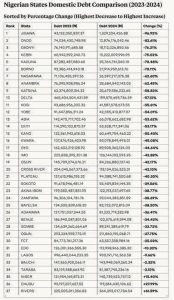New 2024 data on domestic debt reveals Delta State among Nigeria’s top performers in debt reduction, but experts urge scrutiny of the implications.
In a fiscal landscape marked by uncertainty and rising economic pressures, Delta State has emerged as one of Nigeria’s leading debt reducers, slashing its domestic debt by 58.75% in just one year.

According to newly released data comparing subnational domestic debt profiles from 2023 to 2024, Delta’s debt fell from ₦465.4 billion to ₦192.0 billion, positioning the oil-rich state 10th among 37 states in terms of percentage decrease.
While the development has earned Delta State a spot on the debt management honor roll, fiscal experts and analysts warn that the debt reduction, though commendable on the surface, demands deeper interrogation regarding its real-world impact on infrastructure, services, and economic growth.
“It’s one thing to cut debt, but the key question is: what is the trade-off?” noted a policy analyst who spoke on condition of anonymity.
“Are we seeing reduced borrowing because of better revenue performance or simply because major development projects have stalled?”
Possible Drivers Behind the Decline
Analysts suggest three likely factors behind the state’s steep drop in debt:
1. Aggressive Debt Servicing: The government may have focused heavily on repaying outstanding obligations to relieve future fiscal burdens.
2. Borrowing Freeze: Delta may have deliberately curbed new domestic borrowing, possibly due to tightened budget conditions or shifting political priorities.
3. Debt Restructuring: Some of the domestic liabilities may have been refinanced or converted through alternative funding models.
However, without official disclosures or detailed public financial reports, it remains unclear which of these strategies was dominant.
Delta’s Developmental Dilemma?
While fiscal prudence is generally a positive signal to investors and credit agencies, the broader implications for governance and development remain uncertain.
Delta State, which has historically carried one of the highest debt loads among Nigerian states, also grapples with enormous infrastructure deficits, youth unemployment, and recurring issues in the education and health sectors.
“If this debt reduction coincides with reduced capital expenditure, then we may be witnessing austerity by stealth,” warned a development economist.
“The sustainability of this strategy hinges on whether service delivery has improved or declined as a result.”
Context Within the National Landscape
Delta’s debt reduction stands in sharp contrast to Rivers State, which posted a 61.59% increase in domestic debt, the highest in the nation. Conversely, states like Jigawa, Ondo, and Ebonyi led the overall rankings with reductions exceeding 70%, pointing to varying strategies and priorities across the federation.
Notably, while states such as Lagos and Edo showed marginal changes, suggesting borrowing continuity in support of infrastructure expansion, Delta’s deep cut raises questions about whether the government is adjusting to financial realities or avoiding long-term commitments.
A Call for Fiscal Transparency
As Nigeria confronts high inflation, currency volatility, and dwindling federal allocations, subnational fiscal strategies will increasingly shape the nation’s economic recovery trajectory.
Analysts argue that states like Delta must now move beyond top-line debt numbers to clearly articulate how they are managing revenues, funding development, and safeguarding future growth.
Delta’s performance may signal a turning point in fiscal discipline, but without transparency, it could equally mark the beginning of slowed developmental momentum

















